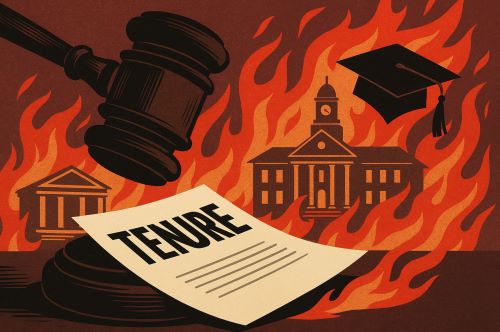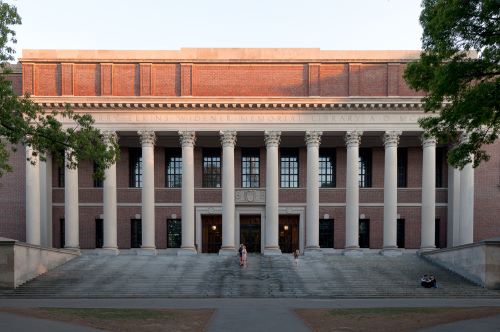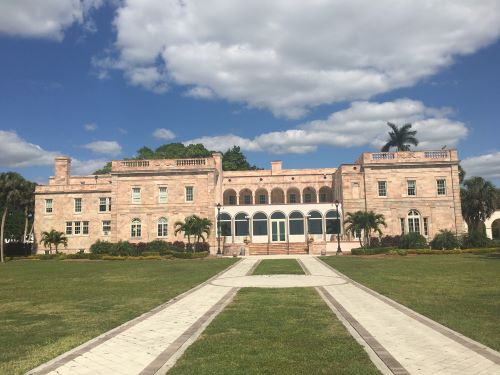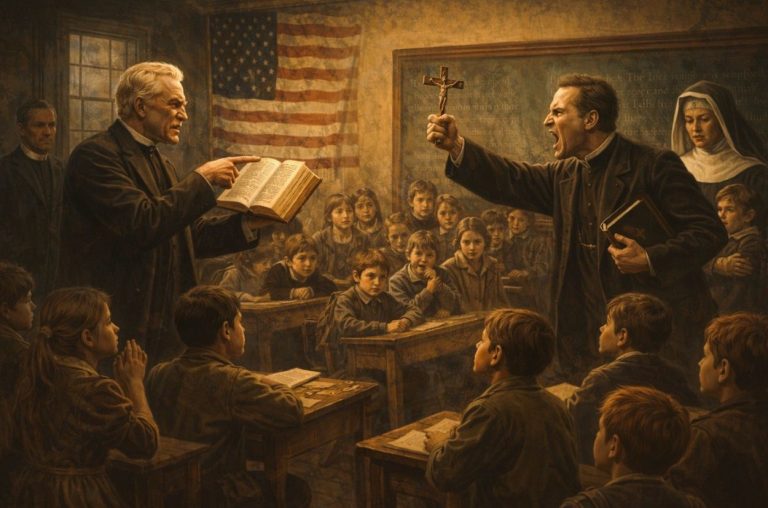

The campaign against tenure and academic freedom is not loud. It wins not when a professor is fired, but when another chooses not to speak.

By Matthew A. McIntosh
Public Historian
Brewminate
Introduction: The Ivory Tower Under Siege
The idea of the university as a bastion of free thought has always been a myth, but it has often been a useful one. For decades, tenure has functioned as the most visible symbol of academic freedom, a fragile firewall between scholars and the volatile pressures of political orthodoxy. That firewall is now crumbling.
Across the United States, Republican-led legislatures are introducing bills that either target tenure directly or gut its meaning by reshaping what professors can teach. From Florida’s “Stop WOKE Act” to bans on Diversity, Equity, and Inclusion (DEI) initiatives in Texas, universities are becoming crucibles for a culture war that seeks to redefine the terms of truth itself. At stake is not only the employment security of faculty but the role of higher education in a pluralistic democracy.
The Legislative Blitz: From DEI Bans to Curriculum Policing
A wave of legislation sweeping across more than twenty states is taking dead aim at what lawmakers deride as “leftist indoctrination.” These bills often fall under the broad banners of anti-DEI and anti-CRT laws, though their reach extends far beyond those initial targets.
In Texas, Senate Bill 17 went into effect in January 2024, prohibiting public universities from maintaining DEI offices, requiring employees to sign statements pledging neutrality, and placing new scrutiny on hiring and curriculum. Florida’s Stop WOKE Act, signed into law by Governor Ron DeSantis, prohibits faculty from advancing ideas about systemic racism or white privilege that make students feel “guilt” or “anguish” based on race. These laws are both vague and sweeping, which is precisely the point. Their ambiguity creates a chilling effect more potent than outright censorship. Faculty begin to self-police out of fear.
Tenure, under this climate, becomes more performative than protective. In some cases, such as at New College of Florida, even tenured faculty have been fired after the school’s ideological overhaul. Tenure may still exist on paper, but paper burns easily.
The Political Logic of Control: Why Universities Matter

Why are colleges being targeted so aggressively? Because they matter. They are among the last remaining institutions where critical inquiry and minority perspectives can gain foothold, where students are trained not only in facts but in habits of dissent. That makes them a threat to any political movement that defines stability through ideological conformity.
The conservative turn against higher education is not new. It echoes earlier anxieties during the Red Scare, when professors were hounded for alleged Communist sympathies. But the current moment is distinct in how directly it legislates pedagogy. Teaching race, gender, or sexuality as systemic phenomena is now not merely unpopular in some regions; it is illegal. The laws are crafted not to clarify standards but to sow confusion and fear, forcing educators to choose between compliance and integrity.
Meanwhile, public trust in universities is also declining, particularly among conservatives. According to a 2023 Gallup poll, only 36 percent of Republicans said they had “a great deal” or “quite a lot” of confidence in higher education, down from 56 percent in 2015. This erosion of trust provides a cultural permission slip for lawmakers to intervene. The idea that professors are “activists” masquerading as educators gives political cover to what amounts to institutional sabotage.
Tenure in Retreat: A Contract Shredded
Tenure has long been a contentious topic, even within academia. Critics argue that it fosters complacency or protects underperforming faculty. But at its core, tenure is not about job security for its own sake; it is a mechanism to safeguard intellectual autonomy. When done right, it ensures that scholars can follow evidence wherever it leads, even into uncomfortable or unpopular territory.
Today, that vision is collapsing. The University of North Carolina Board of Governors, for example, passed policies in 2024 requiring post-tenure review every five years and allowing for termination based on vague performance criteria. In Iowa, legislators introduced a bill that would eliminate tenure entirely at state universities. Although it did not pass, it signaled a broader willingness to dismantle long-standing academic norms.
Even where tenure is not explicitly targeted, its functional value is eroding. Faculty under constant political surveillance, fearing backlash over syllabi or guest speakers, are not free. They are laborers in a state-run enterprise that increasingly views education not as inquiry but indoctrination.
Faculty in the Crosshairs: Stories from the Frontlines

The human cost of these legislative efforts is hard to quantify, but easy to feel. In one widely reported case, Dr. Wendy Moore, a tenured professor at Texas A&M, received an anonymous complaint for discussing race in sociology courses. The university launched a formal investigation. Although she was eventually cleared, the message was unmistakable: tenure no longer guarantees academic freedom.
At New College of Florida, the administration under Chris Rufo, a conservative activist appointed to the board, systematically purged programs in gender studies and replaced them with classical Western curriculum rooted in “patriotic education.” Several faculty members, tenured and untenured alike, resigned or were terminated. The goal was never to debate ideas, but to eliminate some from the table entirely.
These are not isolated incidents. They are the front edge of a broader pattern. And for many young scholars – especially those of color, queer scholars, and those working on controversial or critical topics – the message is unmistakable: your job may be protected, but your speech is not.
Student Learning at Risk: When Education Becomes a Script
The impact on students may be even more corrosive than the impact on faculty. At its best, education teaches students how to think, not what to think. But when curricula are micromanaged by state legislatures, the classroom becomes a script rather than a space.
In Florida, AP Psychology was effectively banned for a time because it included lessons on gender identity. In Texas, students studying American history may now encounter textbooks that omit or sanitize the role of racism, colonialism, or inequality. When universities cannot honestly teach the past, they become complicit in distorting the future.
This is not merely an ideological concern. It has practical implications. Students trained in environments hostile to diversity or critical thought will be less prepared to navigate a global, pluralistic world. Employers increasingly seek graduates who can work across differences and adapt to complexity. Yet these very skills are under siege.
A Fight for the Soul of the University
There are moments when institutional values are tested, not through abstract debate, but through survival. This is one of them.
Faculty unions are organizing more aggressively than in recent decades. Lawsuits challenging censorship statutes are advancing in federal courts. Some universities are quietly working around legislative constraints, embedding DEI efforts under broader language or shifting them to nonprofit foundations. These efforts matter, but they are not enough.
The broader public must be made to care. Academic freedom is not a fringe concern; it is a civic necessity. When professors cannot teach honestly, when students cannot question freely, when universities serve the state rather than the mind, democracy suffers.
Conclusion: The Quiet Extinction of Dissent
The campaign against tenure and academic freedom is not loud. It works through edits, pressures, hearings, and policies. It counts on exhaustion and silence. It wins not when a professor is fired, but when another chooses not to speak.
The question facing universities today is whether they will remain sites of exploration or become organs of state messaging. That answer will not come from courts alone. It will depend on how many of us are willing to say, without apology, that education must remain a realm of freedom, even when freedom is uncomfortable. Because if the university falls, what falls with it is not just a system of employment. It is the idea that truth can be pursued, and that inquiry itself is a public good.
Originally published by Brewminate, 07.18.2025, under the terms of a Creative Commons Attribution-NonCommercial-NoDerivatives 4.0 International license.


